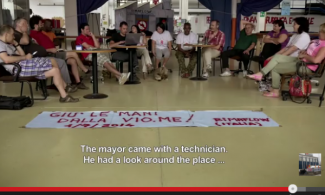(partial) Solidarity Manifesto
1. Deep (radical if you will) social change (economic and political) requires people who can transform their cultural conditioning into new ways of experiencing, relating, and understanding.
Gandhi understood this deeply, so he was able to say it simply and directly: "We must be the change we want to bring to the world." I would make one small change-‘be' to ‘becoming' the change...
Biologically, a dog cannot produce a cat; two orientals cannot produce a caucasian. Culturally, two Spanish speaking people are not going to raise a child who speaks English; people conditioned into being well-adapted to a top-down culture cannot produce an alternative culture with the appropriate alternative economic, social, and political practices and institutions it would require.
2. We don't know a lot about how people can become the change they want to bring into the world.
There are definitely practices, processes, and some institutions emerging to facilitate such change. Compared to the task we need to address, they are embryonic. That is not a criticism. It is an observation of where we are at this point in our history. If we want "a different kind of world that puts people and the planet before profits", then we need people who have the means and support to transform themselves and move towards embodying this kind of world.
3. In a word, we need cultures that promote deep and broad-based solidarity.
Solidarity means "we are in this together." The organic structure of being human is one of solidarity-that is, autonomous, connected, and cooperative. There is the solidarity of the human body, the solidarity of an intimate relationship, the solidarity between parent and child, the solidarity of being there for each other in our ‘hour of need', the solidarity of joy as we celebrate each other's moments of fulfillment, the solidarity of social cooperation that is the ground of individual survival.
Every form of injustice and oppression breaks down solidarity. This threatens individual and social survival as well as quality of life. A world "that puts people and the planet before profits" is grounded in solidarity. The divide between the ‘1%' and the ‘99%' is precisely that, a profound rupture in the organic structure of being human.
4. We need a science of being human.
The biological and social sciences can only focus on parts of human phenomena, not on the phenomenon of being human. The human phenomenon is fundamentally and simultaneously experiential and behavioral. In this context ‘experiential' refers to something that is much more than what we mean by the word ‘subjective'. We are talking about the way we are in the world in every moment from birth to death.
Our behavior is observable, but our experience is not. Yet, there is no behavior without experience so we can't fully understand our behavior without understanding our experience. The ‘objective looking' of science-biology and the social sciences-provides us with a great deal of crucial information. We underestimate this at our peril of becoming the change. However, ‘objective looking' cannot deeply access human experience. Its seeing fades away in the borderland just beyond behavior. Therefore, we need methods of inquiry that draw on science but that can also reach more deeply into experience.
There are body meditation practices that bring our awareness to focus both on the breathing body's experience and the internal reality of what is being breathed in. There are group practices that promote individuals within to compassionately take in the reality of another as she discloses it through verbal and nonverbal behavior, and then to share their experiences of her with her and for her.
This is the domain of inter-subjectivity, otherwise known as human relationship. We need to create the spaces where we can do this kind of learning deeply, frequently, and broadly. Wombs developing the already born so they can re-shape themselves into compassionate, cooperative, and self-empowering individuals.
5. Inter-subjectivity is the domain of a science of being human.
To do this we need to produce the knowledge and passion to drive a solidarity research and development complex that can develop the alternative cultural practices and institutions that would form the alternative economic and political projects for another kind of world. Alternative economics and politics have to be grounded in the realities of being human rather than in either the simple premises that serve mathematical model-making or the ideological conceptions of what it means to be human.


Add new comment